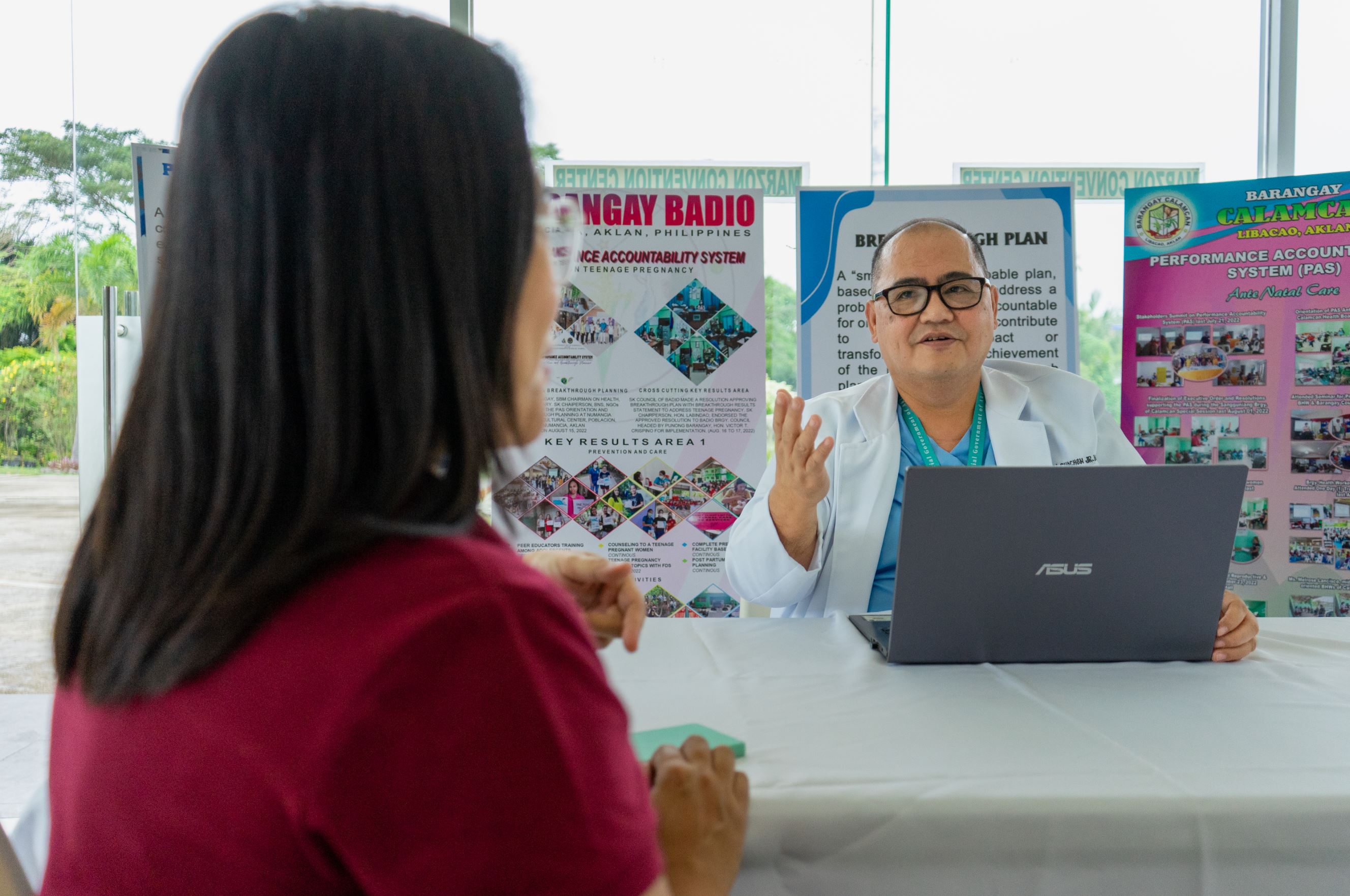Sangguniang Kabataan Chairperson Ryan Macatangay of Balete, Aklan gently sat down on a wooden chair outside a small, old house. A young woman carrying a toddler was in front of him. He had been talking to teenage mothers for a few days in a row, and though quite exhausted, he felt more motivated than ever.
He was interviewing adolescent mothers in their town about their health needs and their quality of life.
“Our study helped us see what programs are needed. During our interviews, it was very sad to hear what these young mothers are going through. Most of them had to stop school,” said Macatangay. He and his team managed to speak with all of the teenage mothers residing in their town.
 Provincial
Department of Health Office Development Management Officer V Dr Feman Rene
Autajay gives his words of gratitude to all the Performance Accountability
System (PAS) implementers and awardees during the Provincial Recognition and
Awarding in March 2023. ©
WHO Philippines
Provincial
Department of Health Office Development Management Officer V Dr Feman Rene
Autajay gives his words of gratitude to all the Performance Accountability
System (PAS) implementers and awardees during the Provincial Recognition and
Awarding in March 2023. ©
WHO PhilippinesAdolescent pregnancy – the pregnancy of girls between the ages of 10 and 19 – was declared by the Philippine government as a national social emergency.
In the Western Visayas region, the Philippine Statistics Authority (PSA) reported that there were 9,760 cases in 2019, almost 10% of which were in the province of Aklan. In the same year, the PSA recorded over 1,400 maternal deaths, and about 5% were from the region.
According to the World Health Organization, childbearing in adolescence carries increased risks for poor health outcomes for both mother and child. Studies have shown that early first birth is also associated with reduced schooling or even dropping out of school, which is, in turn, associated with lower income.
“That is why, as much as possible, we have to prevent teenage pregnancy,” said Dr Fernan Rene Autajay, Development Management Officer of the Provincial Department of Health Office (PDOHO) in Aklan.
 Aklan Governor Jose Enrique Miraflores and municipal mayors of Aklan, Department of Health CHD 6 Regional Director Dr Adriano Suba-an, Provincial Health Office Chief of Hospital Dr Cornelio Cuachon, Provincial Department of Health Office Development Management Officer V Dr Feman Rene Autajay, and representatives from the World Health Organization Philippines at the Provincial Recognition and Awarding for Performance Accountability System in March 2023. © WHO Philippines
Aklan Governor Jose Enrique Miraflores and municipal mayors of Aklan, Department of Health CHD 6 Regional Director Dr Adriano Suba-an, Provincial Health Office Chief of Hospital Dr Cornelio Cuachon, Provincial Department of Health Office Development Management Officer V Dr Feman Rene Autajay, and representatives from the World Health Organization Philippines at the Provincial Recognition and Awarding for Performance Accountability System in March 2023. © WHO Philippines Reaching this goal entails a whole-of-society approach. The Korean Government, through the Korean International Cooperation Agency (KOICA), provided support to the WHO in developing the Performance Accountability System (PAS). It is a process-oriented method that involves local government units, communities, and families in the planning and implementation of local health care programs.
KOICA has been actively supporting the mission of WHO and DOH in improving maternal and adolescent health in the Philippines. Through KOICA’s funding, WHO’s Subnational Initiative Project is being implemented in Aklan, Agusan del Sur, and Davao, providing critical support to improving primary care facilities, community engagement, and leadership and governance using PAS.
“PAS is an innovation to help strengthen local health systems. It is a strategy to improve health service delivery by measuring the performance of stakeholders that play key roles in public health,” said Dr Cornelio Cuachon, Chief of Hospital of Aklan’s Provincial Health Office (PHO).
 Dr Cornelio Cuachon, Provincial Health Office Chief of Hospital, explains the importance of Performance Accountability System integration in the different health programs of the province, especially on teenage pregnancy awareness and antenatal care. © WHO Philippines
Dr Cornelio Cuachon, Provincial Health Office Chief of Hospital, explains the importance of Performance Accountability System integration in the different health programs of the province, especially on teenage pregnancy awareness and antenatal care. © WHO PhilippinesAs part of PAS, a breakthrough plan to address teenage pregnancy and improve antenatal care was implemented in various barangays in Aklan for 60 days. A performance audit revealed that seven barangays in Aklan showed positive results. Top performers on teenage pregnancy prevention were Barangays Feliciano and Calizo in Balete and Barangay Badio Aliputos in Numancia. Barangays with the best indicators on antenatal care were Barangay Poblacion in Kalibo and Barangays Calamcan and Guadalupe in Libacao.
 Barangay Captain Niel Candelario talks about their PAS journey in Barangay Poblacion, Kalibo at the Provincial Recognition and Awarding for Performance Accountability System in March 2023. © WHO Philippines
Barangay Captain Niel Candelario talks about their PAS journey in Barangay Poblacion, Kalibo at the Provincial Recognition and Awarding for Performance Accountability System in March 2023. © WHO Philippines “At the end of the 60 days, we were able to achieve a breakthrough result for our prenatal care. All our pregnant women were master listed, visited, tracked, and provided with essential services,” Poblacion Barangay Captain Niel Candelario said during his speech at the Provincial Recognition and Awarding for Performance Accountability System held in March 2023.
Aklan Governor Jose Enrique Miraflores expressed his support for the integration of PAS starting from the barangay or village level.

“It is not a secret that when everyone is working together for a purpose, it will definitely succeed,” said Governor Miraflores, adding that the awards will serve as inspiration to other barangays as well.
